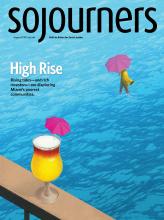THE DAY AFTER the 2016 election, I joined my weekly improv-for-clergy workshop. We were a small group of progressive pastors still in shock. It might be more accurate to say we were still in denial. The election had given us President Donald Trump, and we wanted to scream, “No!”
Though most of us were novices, we knew the first rule of improv comedy: “Yes, and.” You accept what someone else says and build on it. Improv is impossible without “Yes.”
Our teacher asked us, “Would you rather process the election or play?” We were unanimous, albeit tepid, in choosing to play. Laughter seemed the best medicine for shared distress if midday whiskey or a four-year nap were not options. We entered the play of improv that afternoon, testing the art’s fundamental stance captured in the rule of “Yes.” How could we say “Yes” when from our core we wanted to scream “No”?
MaryAnn McKibben Dana, who participated in that group while researching God, Improv, and the Art of Living, reminds us, “We are not in control of our lives. But we can choose Yes.”
Choosing “Yes” lies at the heart of resistance, and thus the insights and practices of improv have a great deal to offer both to activism and to keeping faith through these days when affronts to human dignity and assaults on democracy come faster than laugh lines at a Second City performance.
Read the Full Article

